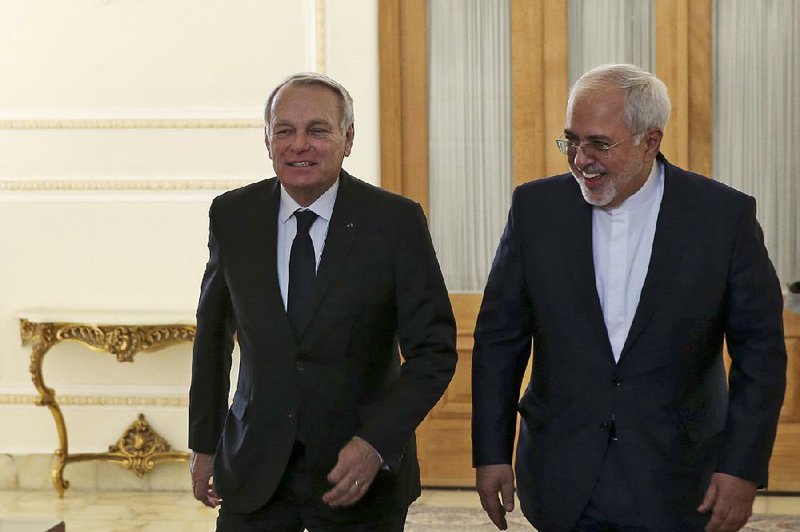TEHRAN, Iran -- Iran's foreign minister on Tuesday refused to confirm whether his country recently conducted a missile test, saying the Iranian missile program is not part of the 2015 nuclear deal with world powers.
The United Nations Security Council met privately later at the request of President Donald Trump's administration, and U.S. Ambassador Nikki Haley said afterward that the world should be "alarmed" at the Iranian test and that the council should take action.
Haley called the medium-range ballistic missile test "absolutely unacceptable" and said Iran is "being naive" by thinking the U.S. and others accept its contention that it has no intention of attacking any country.
"I will tell the people across the world that is something we should be alarmed about," she said. "The United States is not naive. We are not going to stand by. You will see us call them out as we said we would, and you're also gonna see us act accordingly."
During a joint news conference with visiting French counterpart Jean-Marc Ayrault on Tuesday, Foreign Minister Mohammad Javad Zarif was asked if Iran had conducted a recent missile test.
"The missile issue is not part of the nuclear deal. As all signatories to the nuclear deal have announced, the missile issue is not a part of" the deal, he said.
Iran's missiles, he added, are "not designed for the capability of carrying a nuclear warhead. ... Our ballistic missile was designed to carry a normal warhead in the field of legitimate defense."
A U.S. defense official said Monday that the missile test ended with a failed re-entry into Earth's atmosphere. The official had no other details, including the type of missile. State Department spokesman Mark Toner said the U.S. was looking into whether the ballistic missile test violates a 2015 United Nations Security Council resolution.
Zarif on Tuesday said he hopes the issue is not used as "an excuse for some political games by the new U.S. administration. The Iranian people would never allow their defense to be subject to the permission of others."
Iran has long boasted of having missiles that can travel more than 1,200 miles, placing much of the Middle East, including Israel, in range. Iran says its missiles are the key to deterring a U.S. or Israeli attack.
In a video posted on his Facebook page Monday, Israeli Prime Minister Benjamin Netanyahu said he planned to discuss Iran in his coming meeting with Trump in Washington.
"I intend to raise with him the renewal of sanctions against Iran, sanctions against the ballistic missiles and additional sanctions against terror and also to take care of this failed nuclear agreement," Netanyahu said. "Iranian aggression will not go unanswered."
Netanyahu will visit the U.S. on Feb. 15, White House spokesman Sean Spicer said at his daily briefing Monday, when he also said the U.S. was aware of an Iranian missile launch.
In May 2016, Iran's Defense Minister Hossein Dehghan issued a vague denial after a media outlet close to the Revolutionary Guard reported that the country had test-fired a ballistic missile with a 1,200-mile range. The powerful Revolutionary Guard is in charge of Iran's ballistic missile program.
Dehghan said no missile had been tested "with the range that was published in the media," but he did not deny that a ballistic missile had been tested.
In March, Iran test-fired two ballistic missiles -- one emblazoned with the phrase "Israel must be wiped out" in Hebrew.
A 2015 Security Council resolution adopted after Iran reached its nuclear deal with world powers calls on Iran not to take any actions related to ballistic missiles "designed to be capable of delivering nuclear weapons."
Zarif has said Iran's ballistic missile launches are not banned under U.N. Security Council Resolution 2231 because the prohibition only applies to missiles specifically designed to carry nuclear warheads. Iran has long argued that general missile tests are not banned, nor are those applying to ones capable of carrying nuclear warheads -- so long as that was not their designated purpose.
Meanwhile, the European Union called on Tehran to "refrain from activities which deepen mistrust."
EU foreign policy spokesman Nabila Massrali said a ballistic missile test would not be a violation of the nuclear deal with world powers. However, she said, it was "inconsistent" with Resolution 2231.
"Whether it constitutes a violation is for the Security Council to determine," she said.
Russia's deputy foreign minister, Sergei Ryabkov, said the resolution calls on Iran only to abstain from launching missiles able to "carry nuclear warheads," Interfax reported. Russia is confident Iran has no nuclear weapons program, he said.
Information for this article was contributed by Nasser Karimi, Raf Casert and Tia Goldenberg of The Associated Press; and by Ladane Nasseri, Alexei Anishchuk, Stepan Kravchenko, Jonathan Ferziger, Golnar Motevalli and Patrick Donahue of Bloomberg News.
A Section on 02/01/2017
